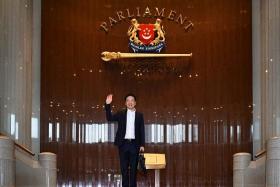Singapore can be pacesetter in Asia
Digital economy offers tax challenges and also opportunities
Our way of life is changing, with economies shifting from the third to the fourth industrial revolution - from computers to digitisation and the Internet of Things (IoT).
In recent decades, technology-enabled disruptions have turned different sectors upside down.
By 2020, an estimated 50 billion devices around the globe will be connected to the Internet. IoT represents a transformative shift for the economy, similar to the introduction of the personal computer itself.
The likes of Alibaba, ebay and Amazon are now commonplace, where sales transactions and services rendered can occur without a traditional "brick-and-mortar" shopfront.
Instead, we see consumers turning to mobile apps, electronic commerce, online marketing or online payment services for the purchase of goods or services.
As the economy becomes more digital, it poses major challenges from a tax perspective. This is especially so given the developments from the Organisation for Economic Co-operation and Development (OECD) Base Erosion and Profit Shifting (BEPS) project.
International tax rules were designed more than a century ago and have not kept pace with international developments arising from digital markets.
The digital economy is characterised by an unparalleled use of intangibles, the massive use of data, widespread adoption of multi-sided business models capturing value from free products and the difficulty in determining the jurisdiction in which value creation occurs.
For example, how do we ascertain which jurisdiction has the right to tax the profits arising from a hypothetical transaction which has a Singapore consumer purchasing a product from a US company, where the products are manufactured in China, the intellectual property (IP) is located in Europe, and the computer servers processing this transaction are in India?
PERFECT OUTCOME
A perfect outcome under OECD's BEPS recommendations would be for profits to be reported wherever substantive economic activities take place and where value is created.
But the practical difficulty in achieving consensus on where the value drivers reside and where substantive operations of businesses are located gives rise to lengthy tax disputes.
Countries around the world have now taken steps to enact laws to tax the digital economy or transactions related to e-commerce.
The Singapore government announced during Budget 2017 that it is actively monitoring the positions of other countries in adjusting their GST systems, given the increase in digital transactions, and is considering whether to do likewise.
While governments around the world would be trying to protect their own tax base by introducing tax in the digital economy, Singapore should not be deterred from attracting "Digital Hubs" to be based here and build key capabilities of its people in data analytics, given the multiplier effect on the broader economy.
Raw data in itself has minimal value, unless it is transformed through analytics. The value is in combining data from different sources (internal and external, structured and unstructured) and extracting insights through algorithms or apps.
With data analytics and data centres growing in importance globally, it is critical for Singapore to be a pacesetter in these areas in Asia.These measures would bolster the case for multinational groups to consider creating their data analytics centres of excellence in Singapore and housing their digital IP as part of their operations here.
Further enhancing its digital capabilities would help Singapore forge ahead in the global competition for companies searching for alternatives to locate their data hubs abroad.
Aligned with OECD's BEPS actions, profits should belong to the jurisdictions where value is created. By specifically recognising "data" as a valuable intangible, digital hubs established in Singapore can also demonstrate to the worldwide tax authorities that the key value driver of the business is located here.
Accordingly, and to the extent that key functions and risks are also located here, Singapore business should be reasonably entitled to significant profits in the value chain.
The recent Budget 2017 announcements reflect Singapore's continued progress and emphasis for digitalisation and innovation.
Singapore remains well placed to become a home for these digital businesses to locate their IP here.
But the underlying question remains: As the world's economy transforms rapidly, how can Singapore seize this golden opportunity and succeed in this digital age?
The writers are from PwC Singapore. Sunil Agarwal is a Global Structuring tax leader; Bernadine Huang is a tax manager in the firm's Global Structuring and Value Chain Transformation practice.
This is an abridged version of an article that was published in The Business Times yesterday.
Get The New Paper on your phone with the free TNP app. Download from the Apple App Store or Google Play Store now


